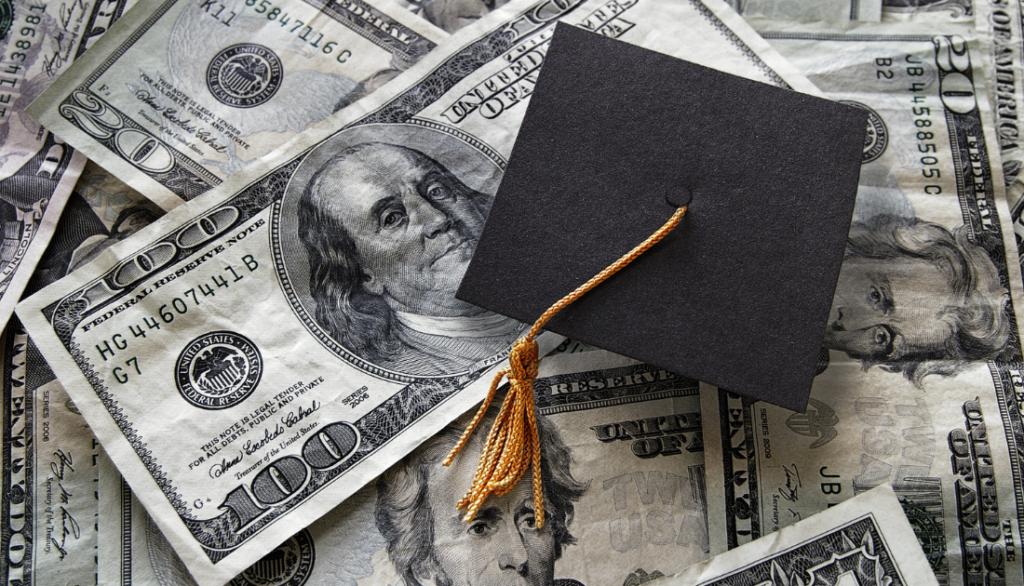As the cost of medical, dental and veterinary school continues to rise, many prospective and current doctors find themselves burdened by significant student loan debt.
According to the Education Data Initiative, on average, physicians graduate with about $264,519 in debt, dentists with $296,500, and veterinarians with $183,302.
The number of medical, dental and veterinary school graduates with educational debt is high, with 73% of medical school graduates and 83% of both dental and veterinary school graduates graduating with student debt.
The world of student loans can be complex and overwhelming, leaving students, trainees and doctors with numerous questions. To shed light on this critical topic, we’ve compiled a list of frequently asked questions about student loans:
See Also: A Doctor’s No-Nonsense Guide to Student Loans
What is the current average student loan interest rate?*
According to Bankrate, current federal student loan interest rates are 6.39% for undergraduate loans and 7.94% for graduate loans. Private student loan interest rates range from 3.24%-17.99% for fixed rate loans and 4.24%-17.99% for variable rate loans.
* These rates are current as of 6/17/2025.
Can I qualify for loan forgiveness?
Many doctors qualify for loan forgiveness through programs like Public Service Loan Forgiveness (PSLF) or income-driven repayment forgiveness. PSLF provides forgiveness for borrowers who work in qualifying public service jobs and make 120 qualifying loan payments.
Many physicians qualify for PSLF. A smaller percentage of dentists and veterinarians are eligible for this forgiveness program. Learn more about who is eligible here.
If ineligible for PSLF, IDR offers loan forgiveness after 20 to 25 years of qualifying payments for borrowers on IDR plans. Find more about IDR here.
PSLF and IDR may be changing. Learn the latest updates »
What is an income-driven repayment plan?
Income-driven repayment plans are federal loan repayment options that calculate your monthly payment based on your income and family size. These plans can help make loan repayment more manageable by capping your monthly payment at a percentage of your discretionary income.
Can I refinance my student loans?
Yes, both federal and private student loans can be refinanced through private lenders. When you refinance, you take out a new loan to replace your existing loans, often with a new interest rate and repayment term. However, refinancing federal loans with a private lender means giving up federal loan benefits, such as loan forgiveness and IDR plans.
What happens if I can’t afford my loan payments?
If you’re struggling to make your loan payments, contact your loan servicer immediately. For federal loans, you may be able to switch to an IDR plan or request a deferment or forbearance, which allows temporary postponement of payments. Private lenders may have their own hardship options, but they are generally less flexible than federal loans.
How do I apply for student loan forgiveness?
The process of applying for student loan forgiveness depends on the type of forgiveness program you are seeking. For federal student loan forgiveness programs, such as Public Service Loan Forgiveness (PSLF) or IDR forgiveness, you typically need to follow these steps:
a. Enroll in an eligible repayment plan: To qualify for PSLF or IDR forgiveness, you must be on an eligible repayment plan, such as Saving on a Valuable Education (SAVE), Income-Based Repayment (IBR), Pay As You Earn (PAYE), or Revised Pay As You Earn (REPAYE).
b. Make qualifying payments: For PSLF, you need to make 120 qualifying monthly payments while working full-time for a qualifying employer. For IDR forgiveness, you need to make payments for 20 to 25 years, depending on the specific plan.
c. Submit an Employment Certification Form: If you are pursuing PSLF, you should regularly submit an Employment Certification Form (ECF) to track your progress and ensure that your employer qualifies for the program.
d. Apply for forgiveness: Once you have met the requirements for forgiveness, you can submit an application for loan forgiveness to your loan servicer.
Here is more information about PSLF and IDR.
Do student loans affect credit score?
Yes, student loans can impact your credit score. Timely repayment of your loans will generally have a positive effect on your credit score, as it demonstrates responsible financial behavior. However, missed or late payments can negatively impact your credit score. Additionally, the amount of debt you owe, including student loans, is a factor in determining your credit score.
Managing Your Student Loans
Navigating the world of student loans can be daunting, but with the right information and understanding of your options, you can make informed decisions about financing your education. Remember, education is an investment in yourself, and with careful planning, you can set yourself up for success in both the short and long term.
For more information about student loans, visit our Resources page or check out one of our curated articles below:
- A Doctor’s Guide To Refinancing Student Loans
- Pros and Cons of Public Service Loan Forgiveness for Doctors
- Pros & Cons Of Paying Student Loans Off Early, According To Financial Planners
Panacea Financial, a division of Primis. Member FDIC.





